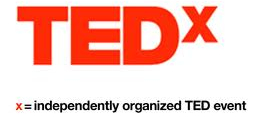 TED.com stands for technology, education, and design. Some of the top and most innovative public speakers can be seen on youtube giving an 18 minute presentation on new and creative topics. It's very competitive to get a speaking slot at a TED.com event, so many presenters are opting to organize and speak at local events called TEDx. I recently attended the TEDx Silicon Alley event in New York City. The theme was "Rise of the Machines," but what stood out to me was the connection between technology and human presentation.
One of the presenters, Ken Segall, represented the agency that worked with Apple. He was the man credited for naming the iphone and ipad. He spoke about Steve Jobs and his focus on the simplicity principle. The presenter showed an effective ad for McDonalds coffee. It stated: Any size for only $1.00. It was elegant in it's simplicity. Da Vinci said, "Simplicity is the Ultimate Sophistication."
TED.com stands for technology, education, and design. Some of the top and most innovative public speakers can be seen on youtube giving an 18 minute presentation on new and creative topics. It's very competitive to get a speaking slot at a TED.com event, so many presenters are opting to organize and speak at local events called TEDx. I recently attended the TEDx Silicon Alley event in New York City. The theme was "Rise of the Machines," but what stood out to me was the connection between technology and human presentation.
One of the presenters, Ken Segall, represented the agency that worked with Apple. He was the man credited for naming the iphone and ipad. He spoke about Steve Jobs and his focus on the simplicity principle. The presenter showed an effective ad for McDonalds coffee. It stated: Any size for only $1.00. It was elegant in it's simplicity. Da Vinci said, "Simplicity is the Ultimate Sophistication."
I continue to focus on the K.I.S.S. principle when I speak to audiences. Whether you say Keep it simple stupid, or Keep it super simple, it's not easy to do. When I coach public speakers I tell them to create a short and long version of their presentation. They discover that's it's easier to create a longer presentation. As Ken explained, "Simple can be harder than complex".
My clients realize they have to work harder to get the message clear enough to be simple. They quickly learn that I act as "the lowest common denominator". These presenters must be able to speak so that I understand the message without being an expert in their industry. One presenter told me that when he worked in a law firm they would give a memo or letter to the assistant to read. If she didn't understand it, they rewrote the letter until it was clear.
The more complex the idea, the crisper the message needs to be. This is especially critical when speaking to the media. Professional speakers have a harder time with media training. Motivational speakers are master storytellers so they must make a shift in their presentation. I show them how to speak in sound bites. The average sound bite is about 10 seconds. If it's not short and simple, it won't land and the audience will check out.
Many of the TEDx Silicon Alley speakers focused on technology, from text to speech to algorithms to flying robots. Whether it's face-to-face or virtual, we can't get away from the need for good presentation. How do you tie these two worlds together? The thread that runs through both is simplicity. Steve Jobs said it best when he said about simplicity: "it's worth it in the end because you can move mountains."
